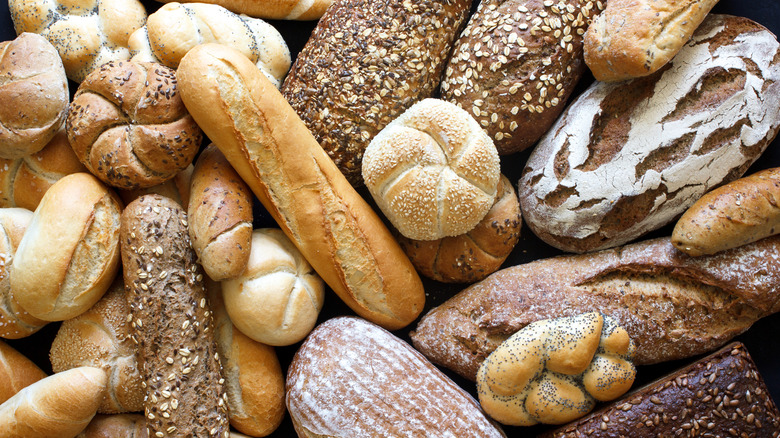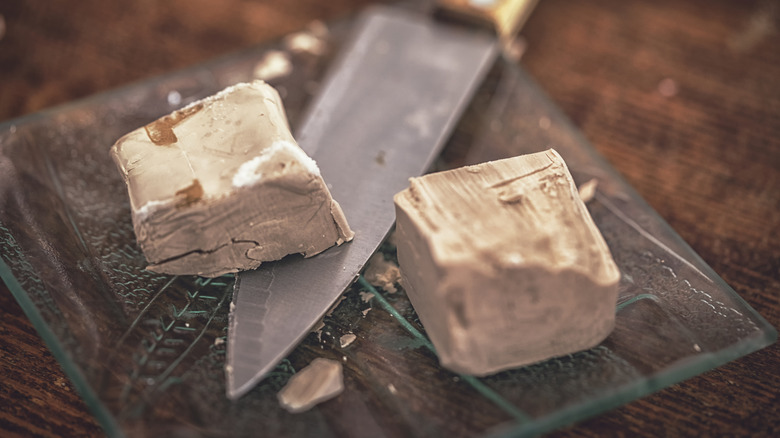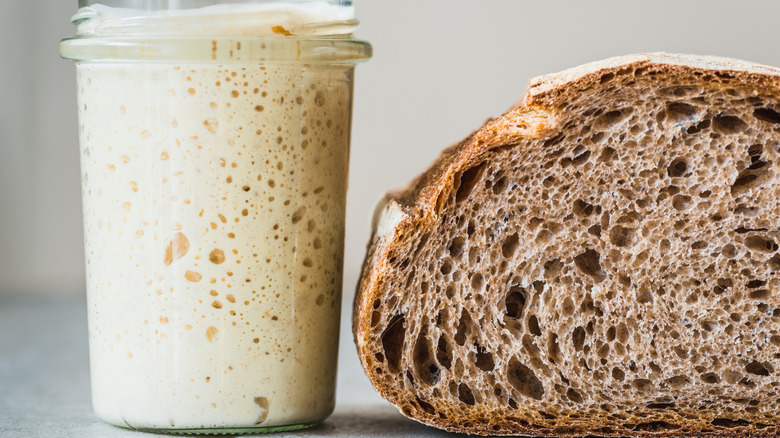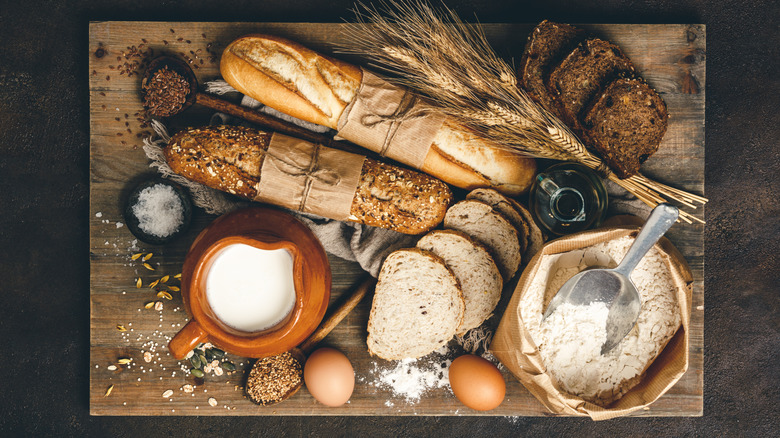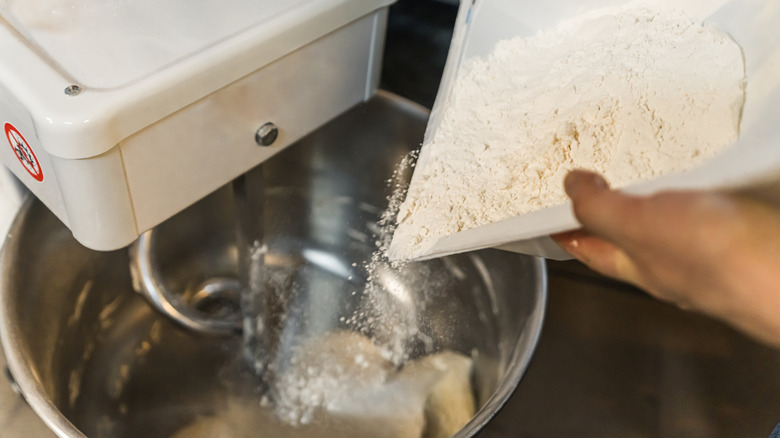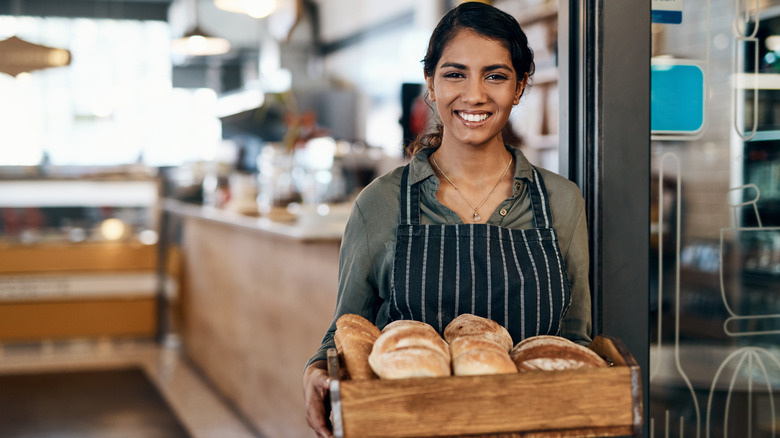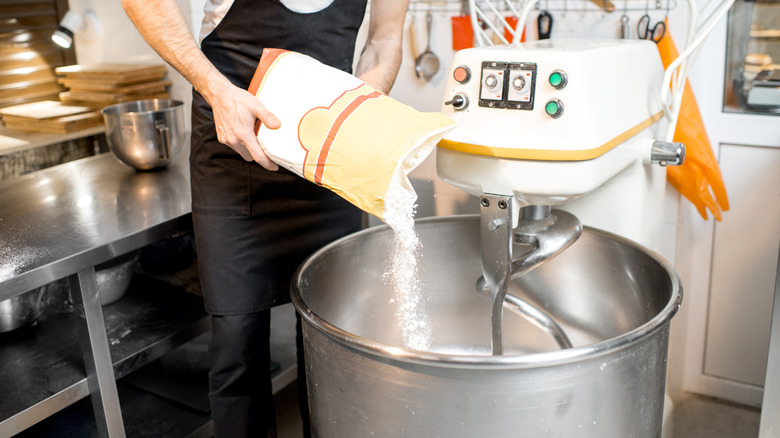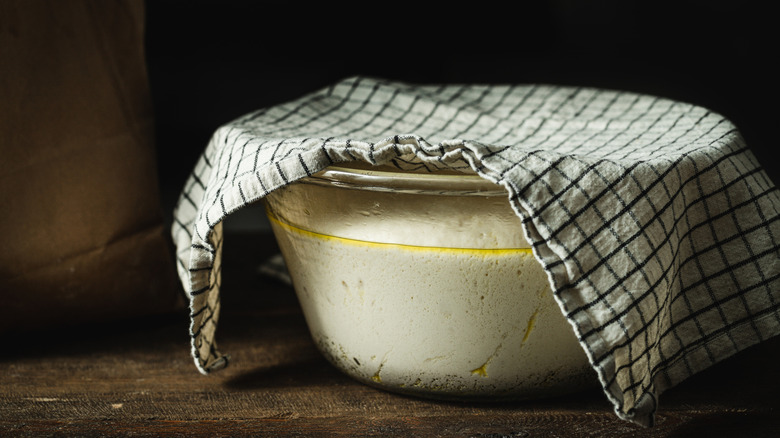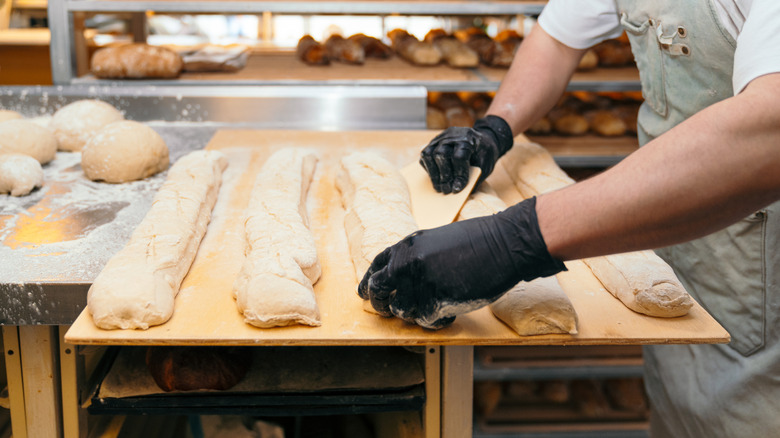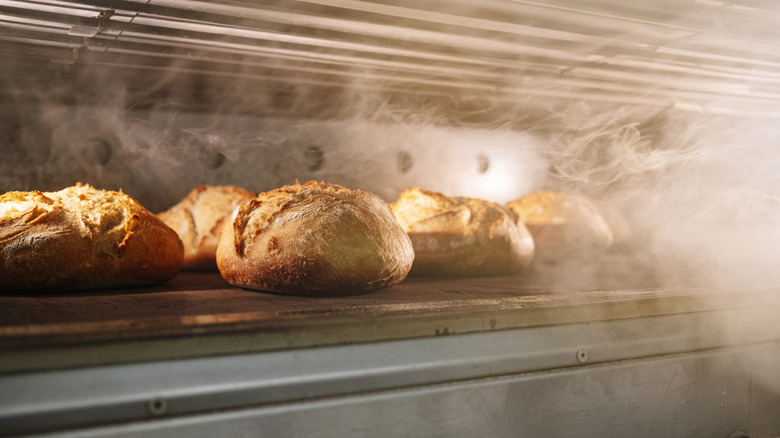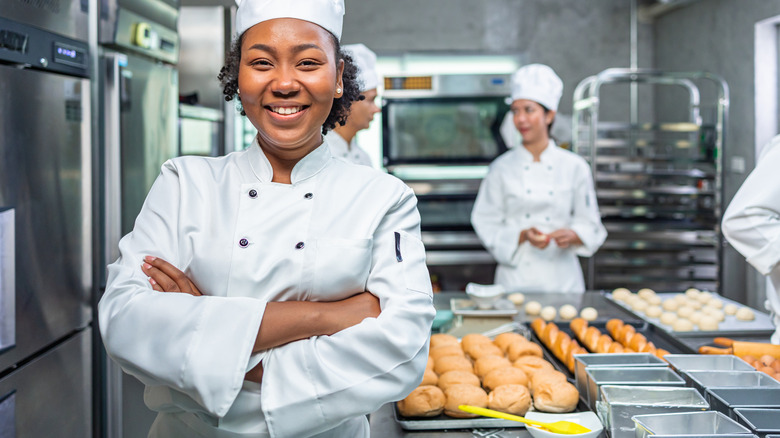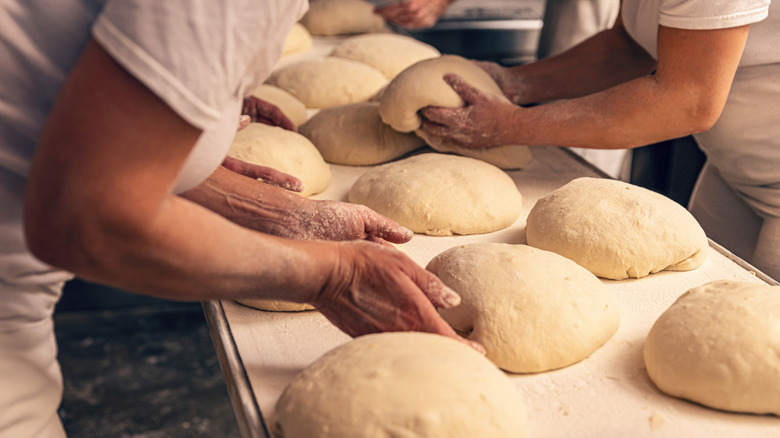Here's Why Bread Tastes Better From A Bakery
Whether it's fluffy challah or chewy sourdough, it's no secret that bread tastes better from a bakery. You just can't compare the kind of loaf you'd pick up at a good bakery to one that comes pre-sliced and wrapped in plastic off a grocery store shelf. And even though homemade bread is pretty great, unless you've spent years dedicated to learning the craft of home baking, your attempts won't be able to match those of an artisan baker.
Still, you might be wondering why bread tastes better from a bakery. What is it about the magic of bakery bread that means many people will happily pay $10 or more for a loaf of sourdough? To find out, I interviewed two experts. First, I spoke to Amy Scherber, a trained baker and founder of New York institution Amy's Bread. Then I caught up with Michelle Morey, a recipe developer at Barefoot in the Pines who used to work as a professional bread baker.
These two authorities on bread answered all my burning questions about how things are done at bakeries. So, it's no longer a mystery why bakery bread tastes so much better than anything you can buy from a grocery store — and what most people can manage to bake at home. Not only will it quench your thirst for knowledge, it might also help you make better bread yourself.
Bakery bread is often made using fresh yeast
What you might not realize is that there are different types of yeast. Most people use some kind of dried yeast at home. It's also what's used to make bread on a large scale — for instance, to sell at grocery stores. Bakery bread, however, is often made using fresh yeast. Although the jury's out, many people say that fresh yeast tastes better. Some argue that it gives a better rise, too.
"We use fresh yeast for most breads," Amy Scherber tells us. "Fresh yeast is alive so you just mix it into the dough and it becomes active." She explains that it doesn't need water or warmth to get started. "Fresh yeast is easier to use and always works great, so that is our preference," Scherber says. However, she adds that Amy's Bread uses dry yeast for breads with eggs in the dough, like brioche or challah.
Some bakeries may use a combination of fresh and dried yeast in the same recipe. "We used fresh yeast strictly for flavor purposes and dried yeast for the actual rising of the bread," Michelle Morey remarks. She notes that had her bakery used just fresh yeast for the volume of dough they were making, they would have needed pounds of it. "The combo gave us the flavor we wanted, but the speedy rise we needed."
Sourdough starters are commonly used for leavening bakery bread
Although you can buy various types of bread at a bakery, sourdough has become one of the most popular options. So, your favorite bakery bread is likely made with a sourdough starter. "Almost all of our breads are made with a sourdough starter or some other pre-fermented starter that gives the bread more character," explains Amy Scherber.
Sure, you can buy sourdough bread from a supermarket. However, one of the big myths about sourdough bread is that grocery store versions are real sourdough. Usually, they just have acidic ingredients added to give them a tang but are leavened using regular yeast. And, yes, you can make sourdough at home. It's not even that tough to make a sourdough starter from scratch. But baking sourdough bread is tricky, and it takes practice and technique to get it right. Plus, constantly feeding a starter gets old fast. Many home bakers give up on sourdough quickly, making bakery bread a better option.
Still, you might be wondering why it matters. "Sourdough starter adds a fuller flavor, it makes the crust thicker and chewier, it provides acidity and it is a natural preservative," Scherber tells us. "Often the hole structure is a bit smaller but it can have open holes, and the crumb is usually very wet and even glossy." She adds that sourdough breads stay fresh longer than those made with commercial yeast before they become moldy or dried out.
Bakers pay attention to ingredient quality when making bread
When you buy bread from a bakery, part of the reason it tastes better is because it likely contains high-quality ingredients. Any baker worth their salt will source the best ingredients they can for their recipes. When you buy from grocery store brands, on the other hand, the companies that make them are often more focused on overheads. They're more likely to buy the most cost-effective ingredients and probably won't worry about quality as long as the finished product is good enough.
"We milled our own wheat berries at the bakery, so that gave us a product unique to our specific bakery," Michelle Morey tells us. And that's just one example of the kind of attention to detail and quality that many bakeries pride themselves on.
"Ingredients always matter in cooking and baking," says Amy Scherber. She notes that if you're looking to make better bread at home, you should use the best flour you can find, adding that it's possible to find some good options at the grocery store. However, if you can find a more specialty product, all the better. "Local grains are fantastic and if you can buy some local whole wheat or rye flour to use in your bread, you will have more flavor and enzymes that make the bread very healthful and great for your body," Scherber explains.
The protein content of the flour is considered in bakeries
The protein in flour is its gluten, so higher protein flours contain more gluten. Since gluten is what gives bread its structure, the protein content of flour matters. Professional bakers will tell you how important it is to choose the right kind of flour with the proper amount of protein. However, beginner home bakers may overlook this. Then, you have huge commercial factories that make bread for supermarkets — they usually use lower-protein flour, which is part of why it doesn't have much bite to it.
"The protein in the flour determines the type of gluten protein that forms in the bread, which impacts the whole structure of the loaf," explains Michelle Morey. "Lower protein and gluten does not make for a strong bread." The ideal protein content for most bread is somewhere between 12% and 15%. So, how do you make sure you get the right amount of protein? If you've ever wondered what bread flour is and how it differs from other flour, the answer lies in its protein content. It contains the perfect amount of gluten for most bread recipes, helping to form an elastic dough that's easy to work with, and producing bread with a nice chew and proper structure.
Bread from bakeries has simpler ingredients than grocery store bread
Among the reasons why bread from a bakery tastes better than loaves from a grocery store is the simplicity of ingredients. When you buy from a bakery, often the bread is made from flour, water, yeast, salt, and not much else. Whereas, when you look at the ingredient list on a package of bread from the grocery store, the likelihood is that you don't recognize half the ingredients.
"Bakery bread is more natural and has no additives," Amy Scherber states. "It uses ingredients that you have heard of and usually has only a few ingredients to make a good loaf of bread." The fact is that you really don't need a whole host of ingredients to make an artisan loaf. And, actually, a huge list of additives and preservatives is a bad sign.
According to Scherber, bakery bread is "more pure compared to a bagged bread from the grocery store." She tells us that grocery store bread "contains preservatives to give the loaf a long shelf life, to keep it soft, and to prevent mold." You might need these additives to make a loaf of bread that can last for weeks without going moldy. But is that a sign of great bread? Absolutely not. The purity and simplicity of ingredients in bakery bread is part of its charm.
Professional bakers will have access to more specialist ingredients than home bakers
You shouldn't expect bakery bread to be filled with preservatives and unnecessary additives the way that grocery store loaves are. However, it's also true that professional bakers have access to specialist ingredients that home bakers might not know about. And this can impact the finished bread. So, if you're wondering why your homemade loaves aren't the same as bakery offerings, this could be part of the reason.
"Bakeries have the knowledge and the resources to use ingredients that may not be available or may come off too intimidating for home cooks," Michelle Morey remarks. "For instance, an experienced home baker may have vital wheat gluten in their pantry, but only after they've read a bunch of blogs and artisan bread making cookbooks." She adds that an average home baker probably won't do this level of research because they're just looking to make a basic loaf.
"Bakeries, on the other hand, have researched, tested, and developed recipes and methods to tailor their bread to exactly the texture and flavor they want," Morey notes. She says that some bakeries may choose to use added proteins (such as vital wheat gluten) or supplements to get the final results that they're looking for. If you want to upgrade your homemade bread, you might have to do some research into the ingredients professionals use.
Bakery bread is often left to rise for long periods
Bread that's sold in grocery stores is often made as quickly as possible to keep costs down, so a long, slow rise isn't on the cards. Bread sold in bakeries, on the other hand, is usually given more time to rise, which improves the flavor. If you're trying to make batter-tasting bread at home, this is something to keep in mind, as it's a simple way to level-up your bread.
"For flavor development, you want to let your dough rise as long as possible," explains Michelle Morey. "So if you can chill it overnight after the first rise and shaping, that's where the yeast starts to eat the sugars and ferment — not a lot, like a sourdough, but you do develop more flavor without the worry of over-proofing."
Amy Scherber also believes that rising time is important, and this is something she puts into practice at Amy's Bread. According to Scherner, "the first rise is critical to developing flavor." She tells us that the initial rise needs to be at least 2 hours but, depending on the type of dough, you may need an even longer first rise for proper fermentation and a great flavor. "After it has been shaped into a loaf it rises again for around 2 to 5 hours and can be baked then or held at a colder temperature to rise very slowly for many hours and baked the next day," she says. "That will usually yield a fuller sour flavor in sourdough, and a more complex flavor in a baguette."
Professional bakers know how to shape bread properly to get the best results
You might not think that shaping bread makes much of a difference to the outcome. Obviously, it lets you create different shapes, such as round boules and intricately plaited loaves. But you may assume that the impact of shaping stops there. However, proper shaping can greatly impact the structure of the loaf, which is part of why bakery loaves are usually so much better.
"The shape determines how much outside surface area becomes the crust and how much crumb it has," Amy Scherber says. So, some breads — such as baguettes — have more surface area, meaning the crust is one of the key elements. Other types of loaves have a smaller ratio of crust to crumb, so the interior structure and texture is more at the forefront. "It is important to learn to shape bread correctly so you preserve the hole structure and leave some open holes in the bread," Scherber adds. "Shaping by machine takes out most holes and changes the inside crumb." A loaf that's inexpertly shaped at home can also suffer from problems with its structure.
That said, some bakeries do use machinery to help them shape certain loaves to get more consistent results. The one Michelle Morey worked at had equipment to help shape bread. "All batches of dough were weighed and cut by hand and rolled through a loaf roller," Morey tells us. "This made every loaf consistently shaped — so you don't have thick ends and skinny middles."
There's often specialist equipment in a bakery
If you're wondering why your homemade loaves aren't the same as bakery bread, it might not totally be your fault. Bakeries have all kinds of professional equipment and appliances that home bakers don't have access to. This kind of gear makes it easier to churn out perfect loaves.
Amy Scherber explains that many bakeries have a stone hearth deck oven with steam, which is significantly different from a home oven. "It allows the baker to get a great crust and a full coverage of steam on the outside of the loaf to give the bread a better oven spring, a deeper color, and a glossier appearance," she tells us. "It helps with browning and gives the crust more flavor."
At the bakery where Michelle Morey worked, they had a room that was made just for proofing, giving them predictable rising times. "In a home kitchen, proofing is dependent on the humidity and temperature in your house," she remarks. A recipe might tell you how long to leave your bread to rise for but it isn't always accurate, since variation in conditions can change this. Without the temperature control of a professional proofer, "you really need to know what you're looking for before popping the bread in the oven," Morey states.
Bakeries have their own recipes and techniques they've spend time perfecting
Bakeries are working with great recipes that they've perfected over the years. Whereas, when you make bread at home, you'll reach for a recipe book or a recipe found online, but it's unlikely to have had quite as much effort put into it, nor will it have been tweaked and improved over years. Store-bought bread is made using a consistent recipe, but it's a recipe designed to produce supermarket-quality bread, not bakery-quality loaves, so it's not the same thing.
"We all use the same basic ingredients: flour, water, yeast, and salt, but look at how many different breads exist, and no two bakeries are the same," remarks Amy Scherber. "It is all about the formulas and the techniques used by the baker." A great recipe and proper technique is what separates decent bread from the truly excellent stuff.
Plus, sometimes bakeries might have several people who work together to perfect their recipes. "The bakery I worked at actually was a brother and sister team and they used each other's recipes," Michelle Morey tells us. "They swapped recipes and problem-solved together." Having that kind of creative dialogue can help take recipes to the next level.
Professional bakers have experience that plays into the finished result
You can't argue with experience, and people who bake bread professionally have piles of it. With early mornings and long days full of hard work, people become bakers because they're passionate about bread, not just because they thought it might be a laugh. And that passion translates into great bread. The average home baker doesn't have quite that level of enthusiasm, nor years' worth of knowledge, so it's natural that bakery bread is better.
"Bread baking is definitely a skill that's developed," says Michelle Morey. "There's a learning process and a lot of trial and error." She laments how frustratingly easy it is to make a loaf of bread like a doorstop. Using hacks for baking bread to make things easier might seem tempting, but it's no substitute for putting the hours in and learning to do things properly.
Amy Scherber agrees that experience plays a role. "Most good bread is made by real people that watch the signs," she remarks. Great bakers know when dough is mixed correctly, when the hydration is right, when dough is ready to shape, and when it has risen enough to bake. "Knowing that takes practice and years of experience," Scherber explains. "These things change from day to day and especially in different seasons and temperatures." Having that baking knowledge and experience behind you means that you can make adjustments so your bread always turns out perfectly.
